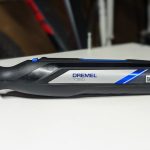We may receive a commission when you use our affiliate links. However, this does not impact our recommendations.
 The two commonly available pure oil finishes that can be used on furniture and woodwork with decent results because they cure – that is, turn from a liquid to a soft solid – are linseed oil and tung oil. There are important differences between these two oils.
The two commonly available pure oil finishes that can be used on furniture and woodwork with decent results because they cure – that is, turn from a liquid to a soft solid – are linseed oil and tung oil. There are important differences between these two oils.
Raw linseed oil cures much too slowly to be practical, so use “boiled” linseed oil instead. It contains driers, which are catalysts to speed the introduction of oxygen and therefore the curing. It isn’t actually boiled.
You have to be careful with tung oil because many products are labeled “tung oil” when they are actually varnish thinned about half with mineral spirits (paint thinner). It makes no difference whether the varnish was made with tung oil; it’s still varnish. It dries hard and can be built up. You can identify these by reading the fine print on the label, which will list a thinner: “contains petroleum distillates,” “contains mineral spirits,” “contains aliphatic hydrocarbons,” which are different names for the same thing. Real tung oil is usually labeled 100% tung oil and never contains a thinner.
The primary differences between linseed oil and tung oil are as follows:
- Linseed oil “yellows” more than tung oil. That is, it turns more orange as it ages.
- Boiled linseed oil cures faster than tung oil, overnight in a warm room when all the excess is wiped off, as opposed to two or three days for tung oil. (Raw linseed oil cures much slower – weeks at a minimum – so raw linseed oil will remain sticky for a long time, even with the excess wiped off).
- Boiled linseed oil used as a finish can be made presentable with just two or three coats, sanding smooth after the first coat. Tung oil requires five or more coats, and you need to sand between each to remove the roughness.
- Tung oil is more water resistant than linseed oil because it has approximately three crosslinks between molecules instead of the slightly less than two for linseed oil. But because neither oil hardens well so neither can be built up thick, both are less water resistant than a built-up alkyd or polyurethane varnish, lacquer, shellac or water-based finish.
If you were to choose between using boiled linseed oil or tung oil for your finish, I would think you would almost always want to use boiled linseed oil. The increased water resistance you get with tung oil is too little to compensate for the increased time and effort required to get a presentable finish with tung oil. Think two-to-three weeks with five or more coats.
Here are some supplies and tools we find essential in our everyday work around the shop. We may receive a commission from sales referred by our links; however, we have carefully selected these products for their usefulness and quality.









The review is great, and the facts are true, especially about the tung oil mold resistance. However, the review does leave out modified tung oil, which, like BLO contains a dryer, and cures overnight. I have found it every bit as good as raw tung oil, except that it has the drying characteristics of BLO. I happen to use the Mohawk brand. I suspect that I will very rarely use raw tung oil again.
Mr. Flexner, As always, you provide me with making my old brain work, thanks! In my family, we have used BLO and turpentine or mineral spirits in a 50/50 mix for all our wooden handles tools, for generations, literally. I’m 61 and still use my Grandfather’s hammer with the same handle. Unlike others, the handles have never produced mold, not even here in the South where humidity can be quite high. I suspect that BLO may have been different in the 1800’s for his father and his father before him but we have never wavered.
The treenware I occasionally carve I don’t use either oil, I now use Pure Flaxseed oil which is raw linseed oil. The reason for me is that there have been a lot of folks developing nut allergies, so I stay away from the walnut oil. Olive oil goes rancid, I stay away from it as well. A friend became upset when I used mineral oil as it is a petroleum product, didn’t bother me, I use Vaseline when needed and have had no ill effects. I don’t find the flax oil to be sticky for weeks. It, like any other oil does require a sanding after the grain has raised, sometimes a couple more sandings depending on the moisture level. So I am curious as to the stickiness you mentioned, is this just on furniture?
We did use pure tung oil many, many years ago on a floor in a very old home we owned. It was a workout that I’m glad I don’t need to repeat in my 60’s but we were very pleased once it was done. And yes, it took multiple coats and many an hour on our knees as well as a few weeks to cure.
I’m also curious to read your take on a high quality urethane vs. polyurethane on a deck or any wood that will be exposed to water…
I can’t say I agree with this review. It left out the mold factor. BLO somehow fosters or feeds mold and Tung oil doesn’t.
The waterproofing is more significant than this review let’s on.
I also am not sure about the coats count. I routinely get good results with pure Tung after only three coats and the sheen lasts longer. Wood treated with BLO looks great at first, but a few years later looks dry. Tung on the other hand still has a sheen that survives more than a few years. I have not found a need to sand after the first coat. That only happens if you don’t wipe off after the 6 hour mark when sometimes some of the oil seeps back out of the wood.
Compare a linseed oil such as Allback against the hardware store brands such as Crown. Think you might find a big difference. I have a section of oak tree in the back yard sitting up on bricks. It survived several years with no problem after liberal application of Allback BLO. I recently rejuvenated it with a mixture of BLO and pine tar, which should make it even better. I have used hardware store BLO on garden tool handles kept under the house where there is dampness; mold grew on the handles. Since converting to Allback, tool handles don’t mold. In fact I love raw linseed oil for tool handles. Handles treated with linseed oil feel much better and provide a superior grip to any film finish.
In every article I read about linseed oil, the author uses the hardware store stuff. No wonder the results are negative. I am not saying Allback is the cure all for everything, but it will result in improved opinions about linseed oil.
I would love to hear your take on Tried & True’s “Varnish Oil”. It received a terrible review from FWW’s Chris Minick but I’ve used it with no issue (Minick’s problem was that it never dried, I think). The company says it uses “natural pine resin”. I’ve emailed them to ask where the resin comes from but not heard back yet. I’m not sure where it falls in the oil-finish or wiping varnish spectrum and would love to hear your take. Thanks!
p.s. Really enjoying “Understanding Wood Finishing”.
In a not really related note, Can you also do a column contrasting and comparing (oh, those college course essay words) alkyd, polyurethane, and urethane varnishes? I am always wondering what we lost when the market shifted to poly’s.
Thanks!
BLO isn’t used by restoration people because it does continue to darken with age. Also, you can find traditional BLO without the heavy metal driers- look for the containers that don’t carry the State of California warning about chromium, cancer, and reproductive risk. ‘Tried and True’ brand finishes are like this.
Linseed oil is NOT a good solution for a front door. The outside is exposed to moisture so Tung oil is better AND it’s better on the indoor side of the outside door also. Linseed oil will stink up the house for weeks.
I’d say the choice which to use highly depends on the project.
Scott
What about polymerized tung oil? How does it compare to BLO? Thanks for sharing your finishing wisdom Bob!